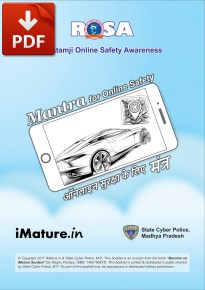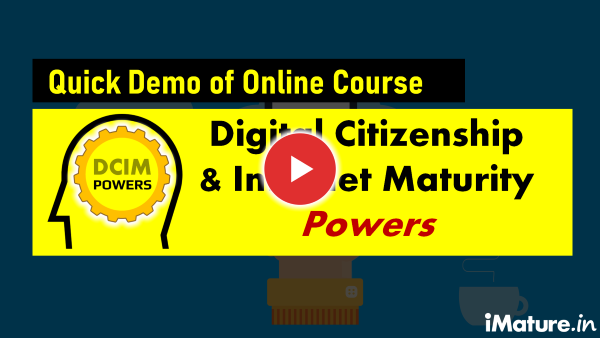
Before you start reading the list below, ask yourself “How many online threats or risks am I aware of? How much harm can those online threats do to my child?”. Don’t think beyond a minute because we only need to check how many threats are on top of your mind.
Now take another minute and think “How many threats will my child face if she ever goes alone into a jungle?”. Was this an easier question for you? For most parents, it is! They are much more aware about the threats in a jungle than the threats on the Internet. Their child might never ever go alone into a jungle, but she goes into the Internet for hours everyday… all alone!
Therefore dear parents, it is critical for you to be fully aware about the threats & risks which your child can will face online (yes, it’s almost a guarantee!). Here is that list which must be on top of your mind ALWAYS...
1. Threats of physical crimes due to online mistakes
Think about all the criminals who can cause physical harm to your child. All those criminals love the social media! That’s because children happily share their details either publicly or in private with cute-looking strangers. It’s very easy for those “cute-looking strangers” to collect your child’s private details about her life, family members, home address, school & coaching, hangout places etc. Those online mistakes of your child can result into kidnapping, rape, harassment, stalking, enticement to drugs, and all sorts of heinous crimes. Remember... criminals love the social media.
2. Threat of cyberbullying
Your child can get bullied or harassed online, not only by criminals, but by other children too! Children who are his schoolmates, classmates or playtime friends. Cyber bullying happens when a child or a group of children repeatedly mocks, threatens, defames, or harasses another child online. It is an undercurrent of the Internet which is not easily visible to the adults. Cyberbullying has been proven to be extremely harmful to the mental health of the victim child. It has been the root cause of many teenage suicides across the world.
3. Threats of cyber crimes by hackers
You must have heard & read about these types of threats in the news many times. In a nutshell, hackers use a combination of technology & psychology tricks to steal or extort money from you, destroy your data, or use your identity to do any illegal activity. Let’s give you a little more clarity about how cyber criminals or hackers can attack your child...
- When hackers want to hide their own identities while doing a cyber crime:
They would hack your child’s social media or email account and send threatening, obscene or fraudulent messages to another person or organization. They can also hack her smartphone or computer to use it to launch a cyber attack on another person or organization.
- When hackers want to steal or extort money from your child:
They would lure her into installing an exciting game or a useful-looking app which contains a hidden malware or Trojan. That Trojan can secretly send private details to hackers like your credit card details or online banking details etc. They can fool her by creating fake shopping websites with irresistible offers or great discounts. They can also do Phishing attack on her by creating duplicate websites of banks and luring her into entering the credit card or online banking details there. They can also use Social Engineering (using fake but believable stories) to fool her into giving out private details over the phone.
This is a very short list of techniques used by hackers to target their victims. It’s actually a Ph.D level topic! You can get a hint on this Wikipedia article - 'Internet Fraud'.
4. Threat of brainwashing by strangers
In the big virtual universe of the Internet, it is easy for your child to come in contact with people who have dangerous ideologies. Those could be extreme form of religion, extreme ways of thinking about life, terrorism, or any kind of anti-social ideology. It is possible that he gets mentally carried towards that. Social media, youtube, twitter and chatting apps like whatsapp or snapchat are very powerful tools to influence any child. So the people who want to brainwash your child to think in a particular way will “groom” him gradually over a period of weeks or months. Their motive is to prepare him mentally to follow their instructions. The instructions could be to:
- take/peddle drugs,
- get involved in porn rackets,
- send money through parents’ credit cards,
- do something destructive against a religion, race or country, or
- commit self-harm.
Remember the blue-whale game? Real children lost their lives because of its influence. It is designed to brainwash a child into believing that suicide is an achievement. It’s a 50-step challenge (basically, grooming process). At the 50th step the player is instructed to commit suicide. There are many such “games” floating around on the Internet.
5. Risk of mental & physical health problems
If you ask psychologists, they can tell you about the variety of mental health issues they are observing in their teenage clients, rooted in Internet. For example:
- Addiction to online games, videos, gambling, porn, or clicking selfies etc. The degree of addiction varies, but a huge number of children are digitally addict.
- Inferiority complex by looking at photos & videos of other people enjoying their life, or having expensive possessions, or achieving success, or having some talent. This results in a chronic feeling “I am not good/happy enough”.
- FOMO – Fear of Missing Out (a trend, an important update, popular meme etc).
- Reduced thinking power due to information overload.
Please also talk to some doctors. They can tell you a long list of physical health problems in children, caused by bad postures and wrong (+long) timings of using digital devices. Here are some common and widespread ones:
- Dry eyes or blurry eyes, known as the ‘computer vision syndrome’.
- Repeated Stress Injury Syndrome (RSI) which is caused by repeated movement of thumbs on the smartphone screen.
- Back and neck problems caused by using the devices in wrong postures.
- Hormonal imbalance problems and obesity due to late-night surfing, lack of physical activity and ignoring the diet discipline!
The scariest thing about these physical problems is that the teenage is the LAST window of growth and formation for your child’s body. If, due to her own Internet immaturity and/or your faulty digital parenting, she misses that last opportunity of healthy growth, she’ll have to spend her life with a compromised body.
6. Risk of mental disorientation due to digital addictions
Mental disorientation is a stage beyond addiction. It means losing the normal sense of priorities and getting completely obsessed with the thoughts of something. In case of addiction, the addicts need their regular dose of the “drug” to carry-on with their normal life. But in case of disorientation, the “drug” (the digital obsession) becomes the normal life! Children can get mentally obsessed with online gaming, selfies, online gambling, pornography etc. Disoriented children start living in the parallel world of games or social media. They constantly think about goals and gratifications of that world. Their priority-list in life gets completely altered. They stop valuing their family, their duties and their physical well-being.
You must have heard the stories of extreme PUBG obsession among children. You might not have heard yet, but the obsession of posting selfies online has been now accepted as a genuine mental disorder called “Selfitis”!
7. Risk of becoming a cyber criminal unknowingly
I am empanelled as a counsellor in the State Cyber Police of MP for counselling children below 18, against whom FIRs get lodged. Each and every case I have seen till now is that of good child from a good family, but ignorant about what’s illegal online.
- Are you sure your child is not bullying another child online?
- Are you sure he is not committing an Intellectual Property theft (plagiarism)?
- Are you sure he is not creating fake IDs of others?
- Are you sure he is not defaming a person or organization online?
Each of the above online acts (and many not listed here) makes him a cyber criminal. Each of those is punishable under law. All of the children I counselled thought “It’s for fun”. None of their parents were aware about what their child is doing online. Two of the children who had applied to universities abroad for their bachelors, had to give-up their dream because of the criminal case against them.
8. Risk of bad or no online reputation
What if those two children I just talked about, had no criminal case against them? Would they have got admission into their dream university? Will your child achieve her dreams if she doesn’t do anything illegal online?
Well… it depends. (Umm.. not enough emphasis. Let’s try again.)
Well… it DEPENDS. (Needs more emphasis. One more try.)
Well… IT DEPENDS A LOT on her ONLINE REPUTATION. And, not just the opportunity to study abroad… EVERY OPPORTUNITY IN LIFE for today’s children depends a lot on their online reputation. Higher education, Job, Business, Personal Relationships, Marriage, Group Memberships, Event Invitations… the list is growing!
Bad online reputation doesn’t kill you. It kills your opportunities. It’s the biggest threat to prosperity & growth in the 21st century. On the flipside, a good online reputation works like an elevator to success. The problem with online reputation is that it cannot be changed easily. Once it is formed, its very difficult to modify it into something else. The thumb rule says “Internet never forgets”. Your child in her immature age cannot think about future effects of bad online reputation on her career and life. So she’d continue to post things on social media thinking that they are “cool”. That will have permanent effect on her online reputation.
What if you child doesn’t post things online and thus have no online reputation? Isn’t that totally risk-free? Sorry… that’s equally risky! That makes her invisible, unsearchable and unimpressive. And that means losing the opportunities to others who are searchable and impressive online. Whether opportunities bounce away from her (due to bad online reputation), or fly past her to someone else (due to no online reputation), she’d lose them anyhow.
The rabit hole of online threats runs very very deep! So, What’s the solution? What should you as a parent do to protect your child?
For threats no.1, 2 & 3 understand and implement the iMature Safety Mantra – “F.A.S.T C.A.R and Secret Location” in your family. The following eBook contains its explanation. This eBook was officially published by the State Cyber Police of MP.

Nice... but what about threats no.4, 5, 6, 7 and 8?
The ONLY solution for overall online safety is to install Internet Maturity into your child’s brain. Having DCIM skills is like having the LICENSE to use Internet. With that license she can drive safely on the digital highways, towards success.
We have created a comprehensive and very enjoyable online course to provide DCIM skills to your teenage child. Please don’t waste even a minute in having second thoughts. Enroll your child NOW! The first 2 chapters are free.

Digital Citizenship & Internet Maturity Powers

Making your child Internet Mature is your biggest responsibility as a digital parent! iMature.in is your partner in fulfilling that :)